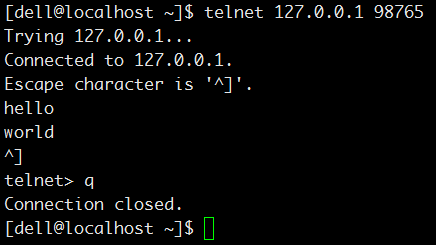epoll测试实例
|
1
2 3 4 5 6 7 8 9 10 11 12 13 14 15 16 17 18 19 20 21 22 23 24 25 26 27 28 29 30 31 32 33 34 35 36 37 38 39 40 41 42 43 44 45 46 47 48 49 50 51 52 53 54 55 56 57 58 59 60 61 62 63 64 65 66 67 68 69 70 71 72 73 74 75 76 77 78 79 80 81 82 83 84 85 86 87 88 89 90 91 92 93 94 95 96 97 98 99 100 101 102 103 104 105 106 107 108 109 110 111 112 113 114 115 116 117 118 119 120 121 122 123 124 125 126 127 128 129 130 131 132 133 134 135 136 137 138 139 140 141 142 143 144 145 146 147 148 149 150 151 152 153 154 155 156 157 158 159 160 161 162 163 164 165 166 167 168 169 170 171 172 173 174 175 176 177 178 179 180 181 182 183 184 185 186 187 188 189 190 191 192 193 194 195 196 197 198 199 200 201 202 203 204 205 206 207 208 209 210 211 212 213 214 215 216 217 218 219 220 221 222 223 224 225 226 227 228 229 230 231 232 233 234 235 236 237 238 239 240 241 242 243 244 245 246 247 248 249 250 251 252 253 254 255 256 257 258 259 260 261 262 263 264 265 266 267 268 269 270 271 272 273 274 275 |
#include <stdio.h>
#include <stdlib.h> #include <string.h> #include <sys/types.h> #include <sys/socket.h> #include <netdb.h> #include <unistd.h> #include <fcntl.h> #include <sys/epoll.h> #include <errno.h> static int flags = fcntl (sfd, F_GETFL, ); flags |= O_NONBLOCK; ; static int memset (&hints, , sizeof (struct addrinfo)); s = getaddrinfo (NULL, port, &hints, &result); for (rp = result; rp != NULL; rp = rp->ai_next) s = bind (sfd, rp->ai_addr, rp->ai_addrlen); close (sfd); if (rp == NULL) freeaddrinfo (result); return sfd; int ) sfd = create_and_bind (argv[]); s = make_socket_non_blocking (sfd); s = listen (sfd, SOMAXCONN); efd = epoll_create1 (); event.data.fd = sfd; /* Buffer where events are returned */ /* The event loop */ n = epoll_wait (efd, events, MAXEVENTS, -); else if (sfd == events[i].data.fd) in_len = sizeof in_addr; s = getnameinfo (&in_addr, in_len, /* Make the incoming socket non-blocking and add it to the event.data.fd = infd; ) count = read (events[i].data.fd, buf, sizeof buf); /* Write the buffer to standard output */ if (done) /* Closing the descriptor will make epoll remove it free (events); close (sfd); return EXIT_SUCCESS; |
具体函数介绍请参考:https://banu.com/blog/2/how-to-use-epoll-a-complete-example-in-c/
运行结果:
服务器端:

客户端:

epoll测试实例的更多相关文章
- JMeter学习-026-JMeter 分布式(远程)参数化测试实例
以前文所述对文章详情的HTTP请求进行性能测试为例.日常实际场景中,不可能所有的人都在同时访问一篇文章,而是多人访问不同的文章,因而需要对文章编号进行参数化,以更好的模拟日常的性能测试场景.同时,因文 ...
- webservice测试实例
webservice测试实例(LR8.1) 接口声明:这个接口是sina的短信服务接口,我只是用来做脚本学习使用,不会对其产生压力:希望读者也只是用来进行录制学习,而不是产生压力. 接口文档:http ...
- [原]在Fedora中编译Libevent测试实例
在我的昨天的博文<[原]我在Windows环境下的首个Libevent测试实例>中介绍了在Windows环境下如何编译一个echo server例子.今天我又试了一下在Linux环境中编译 ...
- C++动态链接库测试实例
前话 上一章节我导出了一个动态链接库 要使用该链接库,我们还需要该链接库对外公开的函数,即头文件 下面开始实例 测试实例 第一步--将动态链接库的dll.lib.和头文件导入项目中 文件目录如下: 项 ...
- Linux下简易蜂鸣器驱动代码及测试实例
驱动代码: #include <linux/module.h> #include <linux/kernel.h> #include <linux/init.h> ...
- 微服务架构 - 离线部署k8s平台并部署测试实例
一般在公司部署或者真实环境部署k8s平台,很有可能是内网环境,也即意味着是无法连接互联网的环境,这时就需要离线部署k8s平台.在此整理离线部署k8s的步骤,分享给大家,有什么不足之处,欢迎指正. 1. ...
- WinForm中 Asp.Net Signalr消息推送测试实例
p{ text-align:center; } blockquote > p > span{ text-align:center; font-size: 18px; color: #ff0 ...
- Confluence 6 从生产环境中恢复一个测试实例
请参考 Restoring a Test Instance from Production 页面中的内容获得更多完整的说明. 很多 Confluence 的管理员将会使用生产实例运行完整数据和服务的 ...
- Rabbit简单测试实例
Rabbit简单测试实例 安装环境: Yum -y install python-pip Pip install pika 生产者 1 2 3 4 5 6 7 8 9 10 11 import pik ...
随机推荐
- sql数据库设计学习---数据库设计规范化的五个要求
http://blog.csdn.net/taijianyu/article/details/5945490 一:表中应该避免可为空的列: 二:表不应该有重复的值或者列: 三: 表中记录应该有一个唯一 ...
- Linux可执行文件后缀问题
一般来说,可执行文件没有扩展名. Linux不根据扩展名判断文件类型,而是根据文件的内容来判断.所以扩展名的作用是帮助人来识别文件,对于Linux系统本身来说没有什么用处. .sh结尾表示是shell ...
- php生成word
https://packagist.org/packages/phpoffice/phpword
- python【数据类型:字典】
字典的定义 infos = {'name':'张晓红','sex':'女','address':'上海','age':18} stus = {"name":"张三&quo ...
- Python之paramiko模块和SQL连接API
堡垒机前戏 开发堡垒机之前,先来学习Python的paramiko模块,该模块机遇SSH用于连接远程服务器并执行相关操作 SSHClient 用于连接远程服务器并执行基本命令 基于用户名密码连接: i ...
- Integer两种转int方法比较
方法一: Integer.parseInt(); 返回的是一个 int 的值. 方法二: new Integer.valueof(); 返回的是 Integer 的对象. new Integer.va ...
- 转:UIView之userInteractionEnabled属性介绍
属性作用 该属性值为布尔类型,如属性本身的名称所释,该属性决定UIView是否接受并响应用户的交互. 当值设置为NO后,UIView会忽略那些原本应该发生在其自身的诸如touch和keyboard等用 ...
- APScheduler定时执行外加supervisor管理后台运行
最近写的天气爬虫想要让它在后台每天定时执行,一开始用的celery,但不知道为什么明明设置cron在某个时间运行,但任务却不间断的运行.无奈转用apscheduler,但是不管怎么设置都不能使得当调用 ...
- Android 动态添加Spinner(.java文件内实现) 实现 改变spinner 内文字属性
动态添加spinner 控件 Spinner s = new Spinner(this); String []items={"自己定义的要显示的数组"}; my_SpinnerAd ...
- HDU 1556 Color the ball (树状数组 区间更新+单点查询)
题目链接 Problem Description N个气球排成一排,从左到右依次编号为1,2,3....N.每次给定2个整数a b(a <= b),lele便为骑上他的"小飞鸽&quo ...
